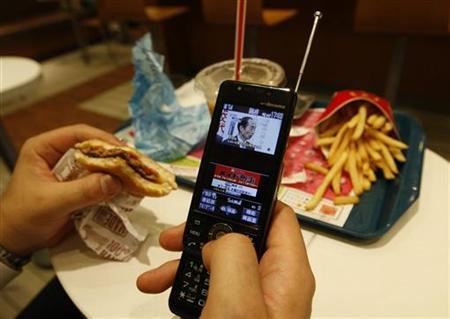


Young Britons have taken to a new television and social media trend which could have far-reaching consequences for the worlds of broadcasting and advertising, according to a new study.
Specialist digital marketing agency Digital Clarity (www.digital-clarity.com) on Tuesday published a survey of 1,300 British mobile internet users below the age of 25 which showed that most use a mobile device to talk to friends about the show they are watching.
The Social TV trend exposed by the study could change the landscape for broadcasters and advertisers chasing youthful eye for on-screen attention, Digital Clarity said in a statement.
Eight out of 10 respondents to the poll said they used Twitter, Facebook or other mobile applications to actively comment on shows and chat with their friends as they watch.
"Up until 12 months ago, TV was struggling to reach the younger market as more and more channels were becoming available," Digital Clarity founder Reggie James said. "Social TV has changed this completely by turning programs into online events where you have to watch them as they happen."
The significance of Social TV is not lost on the television networks which have found themselves with a new marketplace and a different pitch for advertisers, Digital Clarity said.
A joint Nielsen and Yahoo study in the United States last year found that the trend was already well established across the Atlantic with over 86 percent of mobile internet users choosing to communicate with each other in real time during broadcasts, Digital Clarity said.
Last month, the U.S. HBO channel re-ran the Howard Stern film "Private Parts" with Stern simultaneously providing live commentary, which resulted in ratings far higher than could have been forecast for a 14-year-old movie.
Now second screening, as it is referred to in the United States, has become commonplace in Britain too.
"The audience have already taken their seats and are ready to join the conversation," James said. "It's now up to the TV companies to tap into this huge and lucrative market."
One of the key findings of the study was that Social TV is popular because it allows young people to instantly comment on their favorite shows to friends in different locations via the web or mobile phones.
Survey respondent and 20-year-old student Ashleigh Foulser said he loves being able to keep in touch this way with his friends while he is away from home at college.
"They are in different towns to me but it's like having them round to watch TV," he said. "We share a lot of jokes and if I comment on something funny or stupid I get replies almost immediately."
The British survey discovered that the most common way to communicate is to use Twitter (72 percent), followed by Facebook (56 percent) and mobile applications (34 percent), while 62 percent of Social TV users like a combination of all three.
The study found that 34 percent of respondents described the trend as "fun," 32 percent said it made television "more interesting" with 42 percent mentioned the "community" aspect of Social TV.
Certain shows such as "X-Factor," "Skins," "Glee," as well as soap operas "Coronation Street" and "Eastenders" are particularly popular in Britain generating very high Twitter traffic and Facebook messages as they are broadcast.